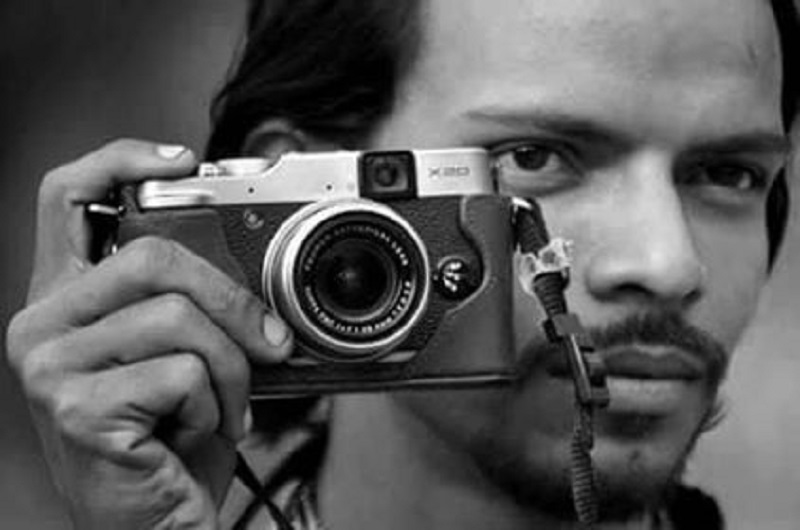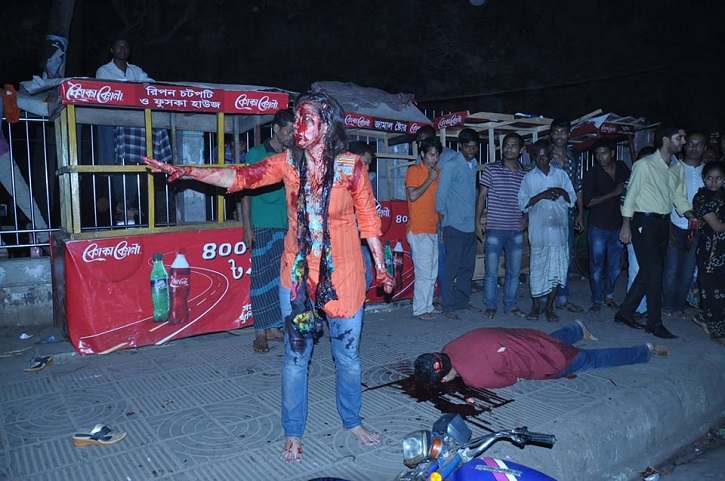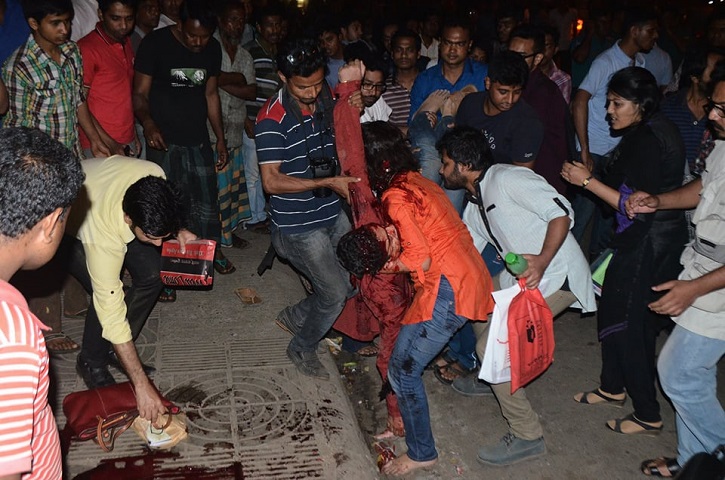Jibon Ahmed
(Jibon Ahmed, a photo-journalist helped Avijit Roy and Bonya Ahmed to get to a hospital after the attack. Translated from original Bengali published in Purboposchim https://pbd.news/open-views/38794/অভিজিৎ-রায়-ও-আমার-দায়িত্ববোধ)
 Three years went by with little notice. During these years, I have spent many sleepless terror-filled nights. This fear will chase me around as long as I live. I do not wish this day to occur in anybody's life. Everyday, fear chases me, I do not know what this fear is. I never had fear of death – ever.
Three years went by with little notice. During these years, I have spent many sleepless terror-filled nights. This fear will chase me around as long as I live. I do not wish this day to occur in anybody's life. Everyday, fear chases me, I do not know what this fear is. I never had fear of death – ever.
To this day, it appears often before me like a movie. When this fear wakes me up at midnight I wonder about what that I am seeing in front of my eyes. I cannot hide myself. It is as if I feel the warm brain of a living man on my palms. Then I cannot control myself. I have never experienced such brutal scene before.
Since then I have been in many lonely fights. Nobody was with me. Everybody left me. I understood, in this big city, if you are in danger nobody would stand by you. But I cannot ever forget this memory, this cannot be forgotten.
It was the evening of 26th February, 2015, the time was 8:30 pm. I used to work for the photo agency Banglar Chokhe then. After the day's work, I was relaxing and conversing with friends at a tea-stall situated just next to the entrance gate of the Suhrawardy Udyan [where the Book Fair is held].
Suddenly a woman's intense scream caught my attention. Through the bars of the fence I saw a motorcycle lying on the road. A woman was lying right on the motorcycle with her head touching the ground. As soon as saw this I immediately came out of the enclosure. After getting through the main gate of the Udyan and proceeding a little further I saw a congregation of people. When I pushed my way through the crowd I saw the bloodied body of a man, wearing a red kurta, lying on the sidewalk. Blood is oozing out of his head and trickling down to the road.
Suddenly I did not know what to do. I looked around and saw that the assembled people were looking at the scene silently. But they were not coming forward to help. There were few policemen there also, but they were also there as silent spectators.
I took courage and proceeded towards the woman who lay fallen on the road. I shook her shoulder a few times to get her up, but she was lying unconscious. She responded, however, after sometime. She looked at me with fearful eyes imagining me as an attacker.
The woman had injuries on her head, blood was oozing out of there and streaked down to the corners of her two eyes. I became afraid looking at her eyes and took a few step back. I cannot forget her terrible gaze. Subsequently, the woman stood up and asked me what had happened there. Pointing with my fingers, I showed her the man lying on the sidewalk.
The woman cried out "Avi" and embraced the man. She kept saying, "Avi get up, nothing will happen to you. Avi, get up." At some point she stood up and raised her hands to plead with the assembled crowd for their help.
 When the woman was crying for help, the people were stepping back. At that moment, I brought out my camera and took a picture of the bloodied couple. As nobody came forward to help, I pushed through the crowd to get a CNG (motorized tricycle). When the CNG came, we put them in there with the help of one or two onlookers.
When the woman was crying for help, the people were stepping back. At that moment, I brought out my camera and took a picture of the bloodied couple. As nobody came forward to help, I pushed through the crowd to get a CNG (motorized tricycle). When the CNG came, we put them in there with the help of one or two onlookers.
As we were traveling to the hospital, Bonya held the body of her husband. I sat holding Avijit's head. I suddenly realized that – through his skull that was cut by a machete - parts of his brain had come out and were touching my palm. I moved my hand and pushed those parts inside. By that time my entire body was wet from the blood that drained from Avijit's head. Before this I did know human blood could be so warm, I feel that heat to this day.
As we proceeded from the incident site to the hospital, Bonya was afraid that I had kidnapped them. She was pleading with me to release them; in exchange she would provide as much money as I would demand. Raising my camera, I repeatedly tried to assure her that I was a photo-journalist, but she did not believe me.
On our way, there was a police check-post where the traffic stopped. As soon as Bonya saw the police she shouted for help saying that I had kidnapped them. I was afraid that I would be the victim of police harassment. To my surprise, I saw, behind us, a policeman on a motorcycle. This man was at the incident site and had seen the entire event. He signaled the check-post police to let us go and we arrived at the hospital.
Their treatment was arranged in the emergency ward of the Dhaka Medical College Hospital. My photo-journalist friends called me to let me know that I shouldn't have got entangled myself in this incident. My job was to take pictures; why did I get involved with this trouble. Even though I was a bit afraid after hearing this from them, my answer was that my first job was to take pictures, which I had done, but then I came forward to help them as a common man forgetting that I was a journalist.
I cleaned my bloodied t-shirt in the hospital and went back to my Motijheel office. There I saw their names - Avijit Roy and Bonya Ahmed - on TV; I did not know them before. My boss advised me to hide in a place away from Dhaka for a few days. I did not agree with him and left the office.
By this time, my photos have gone viral on the social media. Hundreds of comments were pouring in that accused me of taking pictures instead of helping them. I was being criticized in the TV talk shows also. In the meantime, the police interrogated me a few times.
Under pressure from my office I had to leave my job. They told me that they were not going to be responsible for my life. After Bonya got better, she told the investigating authorities that I had played no part in the incident, rather I had saved them that day. After this nobody from the administration contacted me.
Our first identity is that we are journalists. But we are also human beings. We have the sense humanity and love for fellow humans. During our professional work, we encounter various incidents. Sometimes we have to risk our lives to do our job. Many times, notwithstanding our wishes, we cannot fulfill our humanitarian responsibility. This is because of some ethical rules that we need to follow. People still misunderstand us.
On that day, I helped the couple inspired by my humanitarian responsibility. I could have left the place after taking pictures, but my conscience would not let me do it. I did not want to know who they were, I felt that I should step forward as a human being and that is what I did.
Even after this I had to face numerous questions. Many say I helped them to get publicity, but I did not know their identities. Only in my office, through the TV news, I got to know their names.
On Dhaka roads, many lay dead like Avijit, nobody looks at them. We can understand, from this, how low our humanity and social responsibility have descended.
